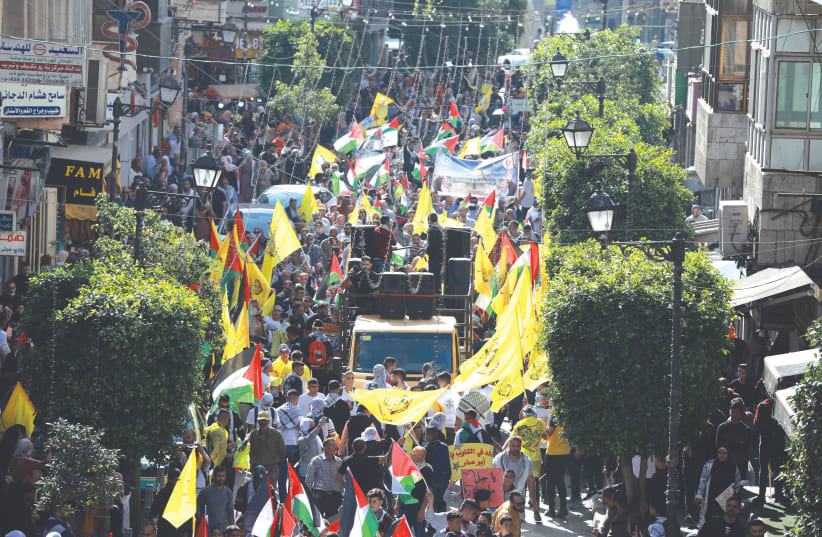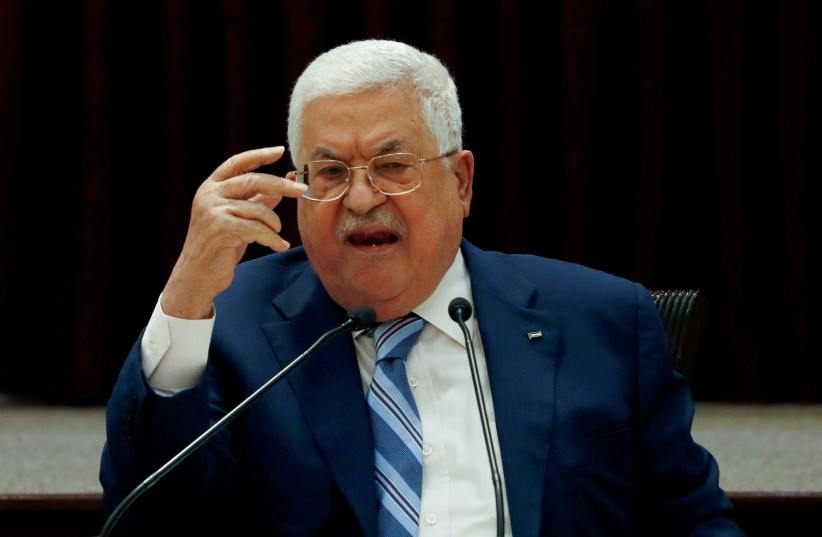In the past week, the Palestinians marked three “historic” events.
First, the 17th anniversary of the death of former PLO leader Yasser Arafat, who died on November 11, 2004. Second, the 33rd anniversary of the Palestinian Declaration of Independence, proclaimed by Arafat on November 15, 1988, in Algiers. Third, the birthday of Palestinian Authority President Mahmoud Abbas, who turned 86, also on November 15.
The first two occasions were marked with relatively small rallies, most of which were held in the West Bank. Abbas’s birthday, however, went unnoticed. His aides pointed out that he is not in the habit of celebrating his birthday, at least not in public.
In keeping with past practice, Abbas marked the anniversary of Arafat’s death and the Palestinian Declaration of Independence by laying a wreath on the tomb of his predecessor in Ramallah and reiterating his commitment to the formation of a Palestinian unity government, while condemning Israel for allegedly undermining the two-state solution and “killing innocent children.”
In the past week, the mood in Abbas’s Mukata presidential compound in Ramallah was anything but upbeat.
The PA is facing an acute financial crisis, mainly as a result of a sharp decline in financial aid from the international community.
The PA says that the crisis is also the result of Israel’s policy of deducting millions of shekels from tax revenues it collects on behalf of the Palestinians. The deductions are equivalent to the amount of money the PA pays to families of Palestinians killed or imprisoned by Israel for carrying out terrorist attacks against Israelis.
Palestinian officials say that the financial crisis is one of the worst the PA has faced in recent years.
PA Prime Minister Mohammad Shtayyeh traveled to Norway this week to participate in a biannual meeting of donor countries to the PA. On the eve of the visit, Shtayyeh said that he will urge the donor countries to increase their financial aid to the PA and pressure Israel to halt its policy of deducting payments from the Palestinians’ tax revenues.
But a senior official in Ramallah said this week that he was not optimistic regarding the chances that Shtayyeh would succeed in his mission.
“The messages we received from the European donors are not encouraging,” the official said. “They are busy with their own problems, especially in light of the outbreak of the coronavirus. We were told that we need to wait until next year for the resumption of the financial aid.”
Meanwhile, Palestinian officials say they are also disappointed with the failure of the Biden administration to fulfill its promise to renew financial aid to the PA.
“The Americans are telling us that we need to be patient,” said another senior Palestinian official. “It seems that the Biden administration is trying to find ways to resume the financial aid without breaking US law, especially the Taylor Force Act, which halted economic aid to the Palestinian Authority because of the payments to the families of the prisoners and martyrs.”
On Wednesday evening, Abbas met in his office with US Ambassador to the United Nations Linda Thomas-Greenfield and again accused the Israeli government of undermining the two-state solution. He said that the Palestinians expect the US administration to fulfill its promises, including the reopening of the US Consulate in Jerusalem and the commitment to the two-state solution.
THE PALESTINIANS are disappointed not only with the Biden administration, but with the Arab countries, too. Repeated appeals by the PA to the Arab governments to fulfill their promises to provide hundreds of millions of dollars in aid to the Palestinians have fallen on deaf ears.
Since the beginning of the year, the PA has not received money from the Arab countries, according to Palestinian officials. This does not come as a surprise, in the wake of the tensions between the Palestinians and several Arab countries, particularly those in the Gulf, after the signing of the Abraham Accords.
The Palestinians are paying the price for their recurring attacks on the Arab countries that signed normalization agreements with Israel. On various social media platforms, the Palestinians are being denounced by their Arab brothers as an “ungrateful people” who are “trafficking in the Palestinian issue.”
It is no surprise that Abbas did not receive messages from most of the Arab presidents and monarchs congratulating him on the 33rd anniversary of the Palestinian Declaration of Independence.
According to the PA’s official news agency, Abbas received “congratulatory cables” from many world leaders, including the presidents of China, Mali, Mauritania, Kazakhstan, Malawi, Nicaragua, Malta and Uzbekistan. By Thursday, the only cables from the Arab world came from Jordan, Egypt, Algeria and Morocco.
Remarkably, while most of the Arab states have turned their backs on the Palestinians, Israel is turning directly toward the PA.
Israel is trying to persuade the donor countries to resume financial aid to the PA. According to some reports, Israel has even asked the Biden administration to pressure the Arab countries to resume financial aid to the Palestinians.
ISRAEL HAS good reason to be worried about the possible collapse of the PA. In recent weeks, there have been growing signs that the PA is beginning to lose control of Hebron and some areas of the northern West Bank, especially Jenin.
Daily clashes between rival clans in Hebron have left residents of the city wondering whether the PA is still in control of the situation. The PA security forces have been unable to stop masked gunmen from setting fire to several shops, houses and vehicles in Hebron. In an unprecedented move, some desperate Hebron residents appealed to King Abdullah to send Jordanian troops to their city to stop the fighting.
“The appeal to Jordan’s King Abdullah aims to send a warning to the Palestinian Authority,” said Ahmad Ja’bari, a businessman from Hebron. “The people of Hebron want to embarrass the Palestinian Authority because it is not doing anything to protect them and their properties. The feeling here is that the Palestinian Authority is not interested in enforcing law and order, because many of the gangsters are affiliated with its ruling Fatah faction.”
What happened in Jenin last Friday was even more disturbing, not only for the PA, but for Israel, too.
Scores of Hamas and Palestinian Islamic Jihad gunmen, along with thousands of Palestinians, participated in the funeral of Wasfi Kabaha, a senior Hamas official who died last week of coronavirus complications.
The public appearance of the Hamas and PIJ gunmen on the streets of Jenin, as well as the large turnout at the funeral, was seen by many Palestinians as a carefully orchestrated challenge to Abbas and the PA.
A furious Abbas responded by dismissing the commanders of the PA security forces in Jenin. He later reportedly instructed his security forces to crack down on Hamas and PIJ members in the northern West Bank.
The increased activities of Hamas and PIJ and growing scenes of lawlessness and anarchy in PA-controlled areas were at the center of the talks last week between Shin Bet director Ronen Bar and Abbas.
During the meeting in Abbas’s residence in Ramallah, the two sides agreed to increase security coordination, combat the influence of Hamas and PIJ and enforce law and order in Hebron and other Palestinian communities.
But the meeting between Bar and Abbas could prove counterproductive, at least as far as the PA president is concerned.
Such meetings are not received well by many Palestinians, who consider security coordination with Israel as an act of treason. Those who publicized the meeting caused further damage to Abbas, who is already facing growing criticism from Palestinians over his “conciliatory” policies toward Israel. Recent public opinion polls have shown that nearly 80% of the Palestinian public wants Abbas to step down.
It is such meetings that make the talk about the formation of a Palestinian unity government sound like a joke. Hamas is not going to sit in any PA government that conducts civilian and security coordination with Israel. Hamas is not going to join any government whose ministers meet with their Israeli counterparts.
Moreover, it is worth noting that Hamas leaders have repeatedly rejected Abbas’s condition for including them in a unity government.
In the past few weeks, Abbas has stated that if Hamas wants to join a unity government, it must recognize all international resolutions pertaining to the Israeli-Arab conflict. Abbas, in other words, wants Hamas to recognize Israel and accept the two-state solution. Those who believe that Hamas will make any concessions on such explosive issues are living under an illusion.
Hamas leaders continue to talk about the “liberation of all of Palestine” and the need to “step up the resistance” against Israel.
Abbas, for his part, does not seem eager to return to the Gaza Strip. Nor does he appear to be serious about bringing Hamas into his government. The talk about “national unity” is mainly intended for internal consumption. He wants to show the Palestinians that he’s not the one responsible for the split between the West Bank and Gaza Strip.
As Abbas and Hamas continue to fight each other, tooth and claw, relations between Israel and some of the Arab countries appear to be moving forward at a rapid pace. These Arabs are no longer concerned with the PA’s acid remarks about normalization with Israel. The only people who are worried about the rapprochement between Israel and the Arab countries are Abbas and his senior officials, in addition to Hamas and Arab and Western “anti-normalization” groups.
Although Abbas is likely eyeing with envy those who have entered into normalization with Israel, he knows that joining the bandwagon would bring his regime crashing down on his head. Thus, he is left to continue his old double game: escalating rhetorical attacks on Israel while relying on it to prevent the collapse of the PA.
The Europeans, for their part, are obviously fed up with Abbas’s repeated promises to hold long overdue general elections, combat rampant corruption and end the dispute between his PA and Hamas. They also seem to be disappointed with human rights violations committed by the PA against Palestinians in the West Bank, particularly the killing of anti-corruption activist Nizar Banat, who was beaten to death in June by PA security officers.
The Biden administration also appears to be keeping a low profile in its dealings with the PA and Abbas. The PA president is said to be disappointed with Biden for refusing to meet with him in New York during last September’s meeting of the United Nations General Assembly. Abbas addressed the meeting via videoconference from Ramallah after canceling his visit to New York because of Biden’s refusal to meet with him.
Shunned by most of the Arab countries and detested by a growing number of Palestinians, Abbas has clearly reached the conclusion that the key to his survival lies in the hands of Israel, the same country that he and the PA work day and night to demonize by accusing it of carrying out ethnic cleansing, killing innocent Palestinians, assaulting Islamic and Christian holy sites and working to “Judaize” Jerusalem.

